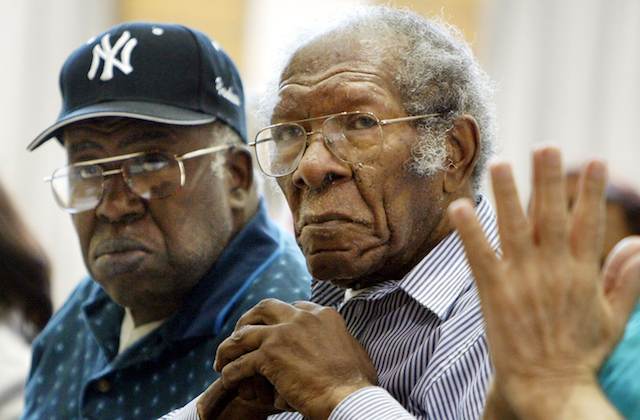Inequity shows up in our lives in all kinds of places, but rarely can it been seen as starkly as when it presents itself in our bodies. Public health long ago established the relationship between poverty and illness. Today’s researchers are also closing in on the link between poor health and racism. The accumulated stressors of racial injustice appear to literally wear our bodies down. Perhaps no set of public health data makes this point more plainly than the statistical trends for life expectancy.
So for our final installment of Life Cycles of Inequity: A Series on Black Men, we’ve pulled together the data that, arguably, represents the sum of our previous six installments: Being a black person in the the United States will take years off of your life. As the chart below shows, we have the shortest lifespan, on average, of any racial or ethnic group in the country.
(It’s worth reiterating here that we present data on Asian-Americans with the huge caveat that it is often misleading. Many data sets clump together Asian immigrant populations that have widely varying economic, civic and cultural characteristics.)
{{image:2}}
Nowhere is the racial gap in life and death more profound than in our nation’s capital. White Americans live longer in Washington, D.C., than anywhere else in the country; they beat both the average lifespan for white people nationwide and the overall national average by more than five years. Black people, meanwhile, die younger in D.C. than anywhere else in the country. On average, black infants born in D.C. in 2010 will have seven fewer years of life than the average person in the U.S.
{{image:3}}
It’s notable that everybody in the U.S. is living a lot longer these days–and that this overall improvement is driven considerably by the lengthening lifespans of black people. Between 1970 and 2010, life expectancy for black Americans grew by 17 percent, according to the U.S. Centers for Disease Control and Prevention, with particularly sharp progress since the mid-1990s. I have lived without knowing the brutality of Jim Crow that was commonplace for my parents and grandparents and as a result, at least in part, I am likely to live much longer than them.
{{image:4}}
Still, life itself is both raced and gendered in the U.S. As a rule, women live longer than men, and black people die younger than everyone else. Which means, when measured by the blunt calculus of mortality, there is no human life more tenuous and fleeting in this country than that of a black man.
{{image:5}}
We know what’s killing black men so early. Research shows five factors are most responsible for the gap in lifespan between black and white men. Heart disease and cancer lead the way. In Washington, D.C., and other parts of the South, HIV/AIDS remains a leading cause of black death as well. All of these conditions are far less fatal when diagnosed and treated early, rather than when they are caught only after someone gets sick.
{{image:6}}
If heart disease and cancer separate the longevity of black and white men, it’s homicide that separates the lives of black men and women.
As the chart below shows, the lifespans of black men and women are eroded by largely the same factors, with the notable exception of homicide among men. This fact, of course, has long stirred strong emotions both inside and outside of the black community. It’s not useful to consider so-called black-on-black crime; all violent crime in the U.S. remains as starkly segregated as every other part of life. But it may be worth considering the ongoing debate about policing in black neighborhoods. Criminologists who are critical of broken windows policing note that it has been a poor tool for solving homicides–the rate of solved murders has plummeted since the 1960s–and one of the key drivers of violence is a cycle of retribution, fueled by the failure to arrest shooters.
{{image:7}}
All of this grim data about mortality begs the question, Why? Sure, we know what factors are shaving years off of black lives. But why the racial disparity in death from those conditions? There are many causes, but we can surely look back to that long-established tenet of public health I mentioned at the outset: poverty and illness are often seen side by side, and black people remain strikingly poor compared to the rest of the nation.
{{image:8}}
There’s also ample research showing that black people have less access to health care than the average American, and that we are less likely to get quality care even when we do visit a healthcare provider. Again, there are many reasons for this: the rate of uninsured; the chaos of poverty that makes preventive health challenging, even when you’re insured; care providers who make assumptions about their black patients that lead to inadequate or inappropriate treatment. The list goes on. But what’s clear is that black people are far less likely to have a health provider than white Americans or the nation overall.
{{image:9}}
And all of this begs another question, too: Do black lives matter? On this, recent months have brought good news. In cities all over the world, huge numbers of people are standing up and declaring, simply, yes. Perhaps speaking it will be the first step toward making it so.
